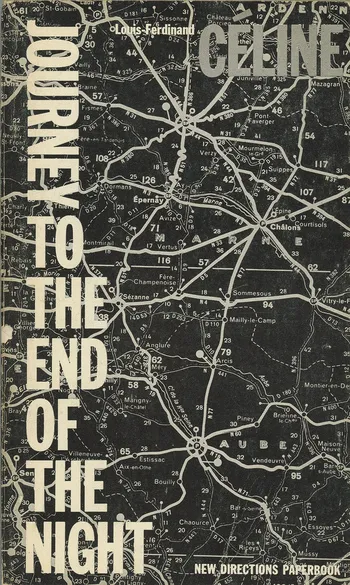by Pedro Blas González (February 2024)

Among the ruins, reason soon turns to vice, like good humour and sleepiness with neurasthenics. You can think of nothing besides your reason. Nothing counts after that. Laughter’s over. —Louis Ferdinand Celine, Journey to the End of the Night
There are many striking ideas in Louis Ferdinand Celine’s novels. Discerning readers can gain much understanding about man and human reality from thoughtful novels. Because he is a novelist, Celine’s most insightful pronouncements can easily be glanced over by casual readers.
Another problem that some readers confront today when reading Celine is that Celine is on the level. This is an old, now archaic term that announces: ‘cut the BS.” This is a shock to the sophomoric worldview of postmodern readers, people who have read very little of substance.
Opposites do not attract, they repel. Because Celine is on the level with readers, this requires that his readers should be much like himself regarding moral and rational, if not reasonable, beliefs about human life, the world and reality.
Readers who lack appreciation for Celine’s poignant appropriation of human reality struggle to understand the man and writer. So, be it. That is the premium we pay for the nature of thought, genuine understanding and the hallmark of wisdom. There is a mind-numbing perversity in the half-baked notion that truth is passive, that it kindly knocks on our door to come sit on our lap. This form of perversity has never been as pronounced as it is in our postmodern, post rational world.
Human Nature
 This brings up the question of human nature, which Celine and many other right-minded thinkers have pointed out, does not change. While thoughtful thinkers argue that human nature does not change, history demonstrates this without a reasonable doubt every day a thousandfold. The best we can do is understand this truism and manage human nature adequately.
This brings up the question of human nature, which Celine and many other right-minded thinkers have pointed out, does not change. While thoughtful thinkers argue that human nature does not change, history demonstrates this without a reasonable doubt every day a thousandfold. The best we can do is understand this truism and manage human nature adequately.
One of Celine’s pronouncements—wisdom that, given postmodernity’s destruction of the human person and psyche, will be best appreciated by people in the future—is that human morals and values do not deteriorate at random. Instead, it takes major prodding by unscrupulous and malign forces to destroy life-affirming values. This is the fabric that informs much of Celine’s writing, which he warned about dating to the 1930s.
Celine argues that society and the degradation of values is directed, thus, provoked and driven into the ground, as it were, through a malefic moral, social/political ideological program. Celine is prescient about this point.
Another bit of wisdom that he passes off to readers is that the modern world passed the point of no return, especially in regards to making man, human life and the human psyche whole again.
So much of human personality, imagination and intelligence has been lost to the dark alleys of history that it warrants asking whether postmodern people even resemble people in the past?
While human nature does not change, morally corrosive eras do indeed degrade and corrode man, opening up a Pandora’s Box of human attributes that civil eras keep at bay. Healthy and noble people learn to manage the dark aspects of human nature.
Several of Celine’s Pronouncements about Reality
 Many of Celine’s pronouncements about reality and the human condition are truly biting, insightful. But, true, nonetheless. Can we handle today what this French author has to say about man’s quest for depravity?
Many of Celine’s pronouncements about reality and the human condition are truly biting, insightful. But, true, nonetheless. Can we handle today what this French author has to say about man’s quest for depravity?
Consider Celine’s indictment of the atrophied level of thought, writing and public discourse in postmodernity, which originate in affected pseudo reason that turns into scientism. The visionary Courtial advises Ferdinand in Death on the Installment Plan about man’s loss of instinct: “Once you’ve looked at a thing, you ought to remember it forever … Don’t force your intelligence … it’s reason that gums everything up … Give your instinct a chance…Once it gets a good look, the game is won … It’ll never deceive you.”
Mere consideration of many of Celine’s pronouncements about truth, man and society, goes against the grain of what people have been programed to believe through intensive and aggressive social/political and moral conditioning in postmodernity. He is adamant that the bombardment of social/political indoctrination that dominates all aspects of postmodern life destroys man’s sense of self, while creating a ‘cardboard world.’
Celine states throughout his writing that nihilism and moral bankruptcy are forces that fuel postmodernity. In Conversations with Professor Y, he writes: “Ad men hunt down, stamp out, persecute anything, unless its phony! … the taste for the authentic becomes lost.”
If Celine, who died on July 1, 1961, came back and took a twenty-four-hour tour of the state of the world and society, circa 2024, he would rightfully pat himself on the back and then begin to weep.
One of Celine’s most penetrating and visionary descriptions of the world to come post the 1960s is a brilliant series of long passages on the future of depravity, nihilism, madness and psychiatry. These passages define the essence of his seminal novel, Journey to the End of the Night:
- “Ferdinand, is it not true that in the face of a truly modern intelligence, everything in the end assumes equal importance? Nothing’s white … nor black either … It’s all unravelled. That’s the new system! It’s the fashion! Then why not, for a start, go mad ourselves? Right now? And boast of it to boot? Make one great parrot house of it, and ourselves advertise our madness!”
- “Possessed, malignant, captious and cunning, these favourite exponents of modern psychiatry, by dint of superconscious analyses, are thrusting us down into the abyss.”
Baryton, the owner of the insane asylum, as these institutions were called then, offers Ferdinand a hellish prediction of the world of the near future. Celine’s Journey to the End of the Night (Voyage au Bout de la Nuit) was published in France in 1932:
- “Some day, Ferdinand, if you of the younger generation do not react against al this, the fatal slip will have occurred—understand me, the fatal slip! For we are overreaching ourselves, sublimating ourselves, bludgeoning our brains, and we shall have crossed the border line of intelligence, to the other side, the fearful side from which there is no return…”
- “Everything will crumble, Ferdinand; everything is crumbling. I predict it, I, Baryton, an old man, and it won’t be long now, either! You will live to see this tremendous rout, for you are still young. You will live to see it! Ah, and I promise you you will have some fun … You will all join in aberration, in one vast burst of madness!”
Table of Contents
Pedro Blas González is Professor of Philosophy in Florida. He earned his doctoral degree in Philosophy at DePaul University in 1995. Dr. González has published extensively on leading Spanish philosophers, such as Ortega y Gasset and Unamuno. His books have included Unamuno: A Lyrical Essay, Ortega’s ‘Revolt of the Masses’ and the Triumph of the New Man, Fragments: Essays in Subjectivity, Individuality and Autonomy and Human Existence as Radical Reality: Ortega’s Philosophy of Subjectivity. He also published a translation and introduction of José Ortega y Gasset’s last work to appear in English, “Medio siglo de Filosofia” (1951) in Philosophy Today Vol. 42 Issue 2 (Summer 1998). His most recent book is Philosophical Perspective on Cinema.
Follow NER on Twitter @NERIconoclast
- Like
- Digg
- Del
- Tumblr
- VKontakte
- Buffer
- Love This
- Odnoklassniki
- Meneame
- Blogger
- Amazon
- Yahoo Mail
- Gmail
- AOL
- Newsvine
- HackerNews
- Evernote
- MySpace
- Mail.ru
- Viadeo
- Line
- Comments
- Yummly
- SMS
- Viber
- Telegram
- Subscribe
- Skype
- Facebook Messenger
- Kakao
- LiveJournal
- Yammer
- Edgar
- Fintel
- Mix
- Instapaper
- Copy Link







2 Responses
“Journey to the End of the Night” has endured as one of my favorite books. I view it more as a poem than novel. When depressed, I would open it about anywhere and begin to read. Having something done so well always picked me up. And Celine was master of the rant! None better. I’ve read the closing passages to this novel so many times; it’s beautiful.
One of my favorites too, Cary! I’ve even got a comic book version of Voyage au bout de la nuit. Once, I visited in Paris, the “shopping mall,” where Celine grew up as a kid. My favorite Celine quote: « La merde a de l’avenir. Vous verrez qu’un jour on en fera des discours. » [I’ll loosely translate: Shit has a future. You’ll see that one day we’ll be writing about it.] Hey, I’ve been writing about it for quite some time now! In fact, it is the shit that pushes me to create essays, poems, and cartoons. Or as I like to say in a somewhat less vulgar way: from the dross, I create. Vive Celine ! Vive Louis-Ferdinand Destouches !